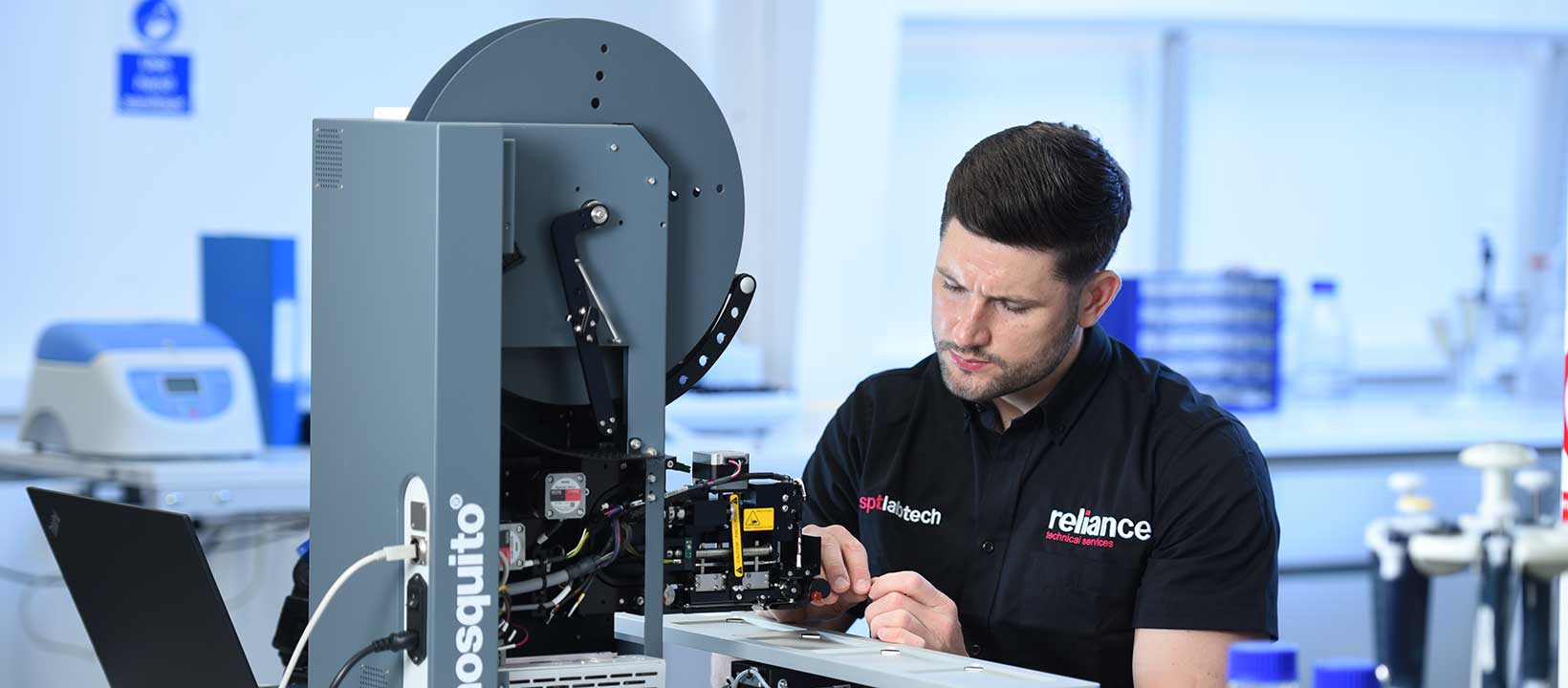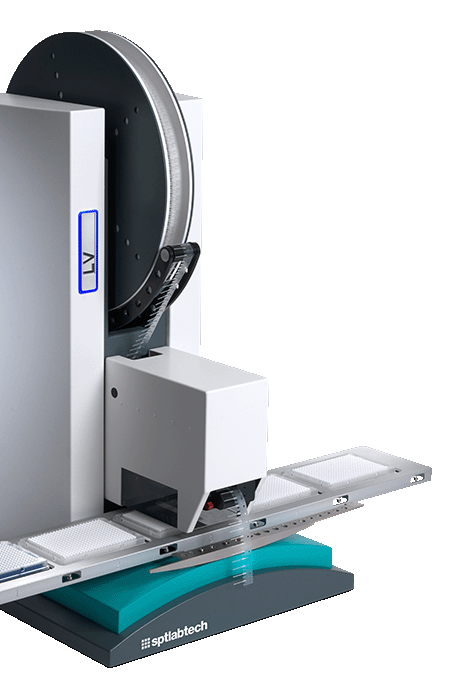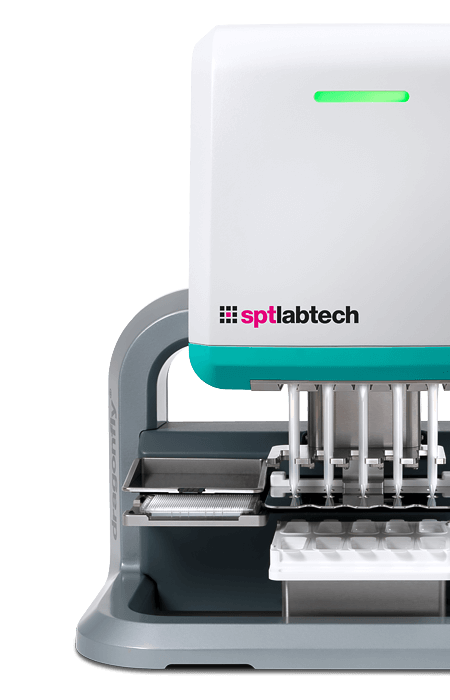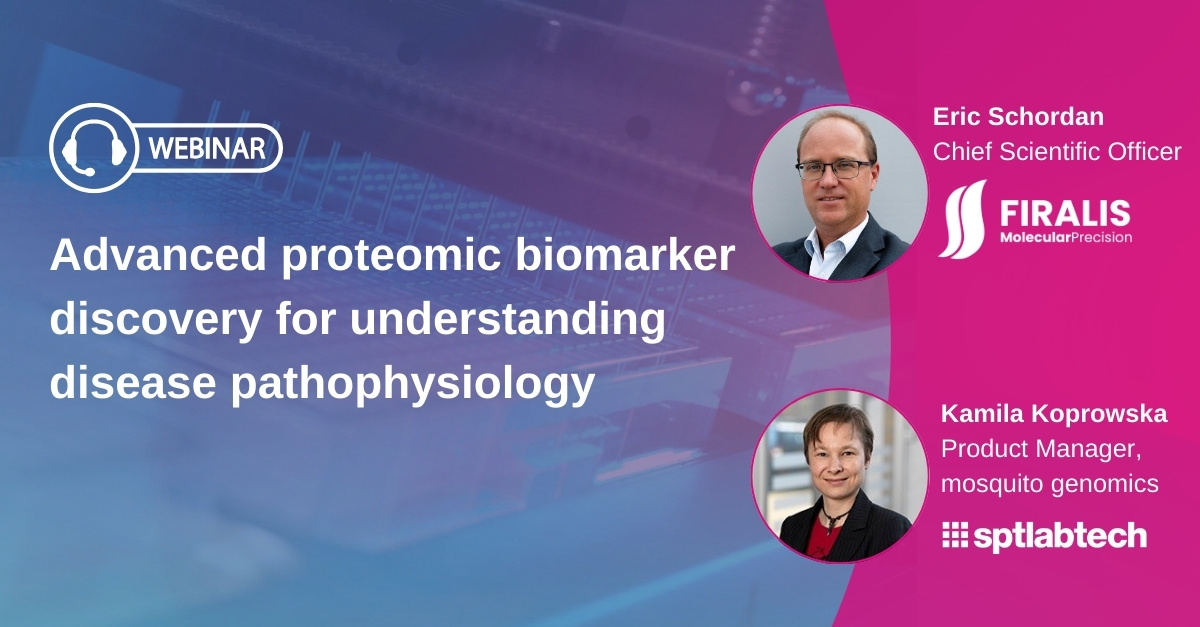
- Applications
-
Products
-
Liquid Handling
- firefly Accelerate genomic research with innovative all-in-one, compact liquid handling
- mosquito Nanolitre liquid handling technology performs ‘traditional’ tasks at a fraction of the volume, and higher speeds
- dragonfly Delivers accurate and repeatable nanolitre to milliliter dispensing
- apricot Automated liquid handling instrumentation for convenient general use across your entire team
- Sample Preparation
-
Sample Management
- comPOUND A scalable, reliable, and secure compound management solution
- BioMicroLab Easy-to-use sample management automation instruments
- arktic Robust biospecimen storage and management down to -80°C
- lab2lab Novel sample and data transfer network system
- comPACT Reliable and efficient -20°C storage and retrieval has never been more accessible
-
Liquid Handling
-
About
- Company With a focus on liquid handling, sample preparation and sample management, our expert teams create state-of-the-art solutions that scientists and researchers can trust Culture We have one overarching mission: to work together to accelerate life science research. Through our innovative solutions and state-of-the-art tools, we believe we can make a real difference to human health Partners Collaboration is key in our mission to make a real difference to human health. Partnering with application leaders globally, we co-create to solve new challenges across the life sciences. Innovation From the initial prototype through to manufacturing, installation and beyond, we bring a problem-solving mindset and technical expertise to drive innovation
-
Executive Leadership
 Through strategic guidance, visionary thinking, and a relentless pursuit of excellence, our senior executives steer SPT Labtech towards achieving its mission of making a real difference to human health through solving advanced laboratory challenges.
Learn more
Through strategic guidance, visionary thinking, and a relentless pursuit of excellence, our senior executives steer SPT Labtech towards achieving its mission of making a real difference to human health through solving advanced laboratory challenges.
Learn more 
-
View all
 Board of Directors
Board of Directors
 Our Board of Directors are committed to driving the long-term success and sustainability of SPT Labtech, providing expert guidance and oversight to execute the company’s ambitious commercial strategy.
Learn more
Our Board of Directors are committed to driving the long-term success and sustainability of SPT Labtech, providing expert guidance and oversight to execute the company’s ambitious commercial strategy.
Learn more 
-
Knowledge Base
- Resources Our wide range of insightful resources include videos, whitepapers, eBooks, application notes and more Events & Webinars Meet the SPT team at events all over the globe and virtually via our webinars Podcast We chat with innovators and leaders from across the community to gain their unique insights. News Latest news from SPT Labtech globally Blog Our latest blog posts feature trends in research, innovative techniques and new technology
-
26 March, 2025
 SPT Labtech and Biortus Launch Joint Laboratory of Structural Biology in China
Continue reading
SPT Labtech and Biortus Launch Joint Laboratory of Structural Biology in China
Continue reading 
-
17 December, 2024
 Connect with SPT Labtech at SLAS 2025
Continue reading
Connect with SPT Labtech at SLAS 2025
Continue reading 
-
16 December, 2024
 SPT Labtech 2024 Year in Review
Continue reading
SPT Labtech 2024 Year in Review
Continue reading 
10
- Careers
Proven miniaturization technology to bolster high-throughput protein biomarker discovery
Explore new heights in high-throughput protein biomarker discovery with our powerful automated low-volume liquid handling technology. Harmoniously integrated with the expansive Olink Explore platform, our instruments enable swift, precise, and accurate execution of large-scale proteomic studies, spanning all crucial biological pathways.
.png)
Our ‘dynamic duo’ combines the highly accurate positive-displacement pipetting of mosquito® and the robust and reliable non-contact nanoliter-to-milliliter dispensing of dragonfly® discovery. This proven partnership has been widely validated across NGS methods, enabling genomics researchers to benefit from significant cost savings by drastically scaling down reaction volumes and extending the use of precious reagents and samples. Leveraging this technology with Olink Explore platform enables laboratories working across the life sciences to uncover new biological insights from minute amounts of sample.
Why choose our dynamic duo?
Unrivalled precision and accuracy even at ultra-low volumes
Work confidently without fear of harmful pipetting errors, critical for success in highly sensitive quantitative assays such as Olink’s proximity extension assay (PEA).
Reliable and seamless operation across different experiments
Eliminate technical variability as a single low-cost mosquito spool provides enough disposable tips for multiple runs.
Proven solutions with a global footprint
Thousands of researchers around the world are already leveraging our dynamic duo to drive efficiency in their liquid handling workflows, with over 80 deployed for Olink Explore alone.
The chosen technology for service providers
Out of the 37 global Olink Explore service providers, 36 are equipped with mosquito and dragonfly discovery.
Webinar: Supercharge your Olink workflow with the right liquid handling tools
Hear first-hand the value of positive displacement technologies for effective multi-omics assay miniaturization.
Paper: Introducing Olink Explore for High-throughput Proteome-wide Analysis
Explore the advanced tool for protein discovery and quantification, performed using SPT Labtech’s innovative miniaturization technology.
Hear from our dynamic duo users

"SPT Labtech enabled Firalis Molecular Precision to handle low-volume liquids with high reproducibility in the Olink Explore Process using the mosquito and dragonfly instruments. It allowed our experts to fully automate the biomarker screening process and provide better and higher quality results to our clients."
— Aurélien Virciglio, Proteomics Lab Head, Firalis Molecular Precision
Success highlights
There have been over 90 publications showcasing our dynamic duo for the Olink Explore platform since 2021. We’ve highlighted a few examples below:
| Publication | Description |
|
Sun et al. (2023) Plasma proteomic associations with genetics and health in the UK Biobank. Nature, DOI: 10.1038/s41586-023-06592-600 |
The largest proteomic study conducted to date (over 54,000 UK Biobank participants) by the Pharma Proteomics Project reveals biological insights into proteomic disease signatures, and prediction models for demographic and health indicators. The results not only validated several established proteomic associations, but also uncovered 4,287 pQTLs (protein quantitative trait loci), 81% of which are novel genetic associations with protein levels that have not been previously reported. |
|
Dhindsa et al. (2023) Rare variant associations with plasma protein levels in the UK Biobank. Nature, DOI: 10.1038/s41586-023-06547-x |
An extensive rare variant proteogenomics study by AstraZeneca Genomics Initiative included 2,923 plasma protein abundances measured in 49,736 UK Biobank human exomes. The paper highlights several examples of how this protein-coding pQTL atlas can address drug discovery and clinical pipeline challenges. It is anticipated that this resource will provide novel insights into protein regulatory networks, upstream trans regulators of target genes whose inhibition could increase target protein levels, target safety assessments and drug repositioning opportunities. |
|
Álvez et al. (2023) Next generation pan-cancer blood proteome profiling using proximity extension assay. Nat Commun, DOI: 10.1038/s41467-023-39765-y |
The paper describes a strategy for cost-effective pan-cancer analysis of blood protein profiles with the goal to allow simultaneous identification of cancers using only a few microliters of blood. This approach combined with machine learning and traditional cancer screening procedures could facilitate the discovery of cancers early, and thus help clinicians to start treatment of cancer patients at earlier stages. |
|
Sveinbjornsson et al. (2022) Multiomics study of nonalcoholic fatty liver disease. Nat Genet, DOI: 10.1038/s41588-022-01199-5 |
Integration of genome-wide association study of non-alcoholic fatty liver, cirrhosis and hepatocellular carcinoma with gene expression and proteomic data identifies new sequence variants, putative casual genes and multiple proteins involved in liver disease pathogenesis, underscoring them as potential drug targets. The study highlights the potential of measurement of plasma proteins to serve as a non-invasive tool for use in the diagnosis and monitoring of disease. |
|
Zannad et al. (2022) Effect of a sodium-glucose cotransporter-2 (SGLT2) inhibitor on circulating proteomics in heart failure: mechanistic insights into the EMPEROR programme. European Heart Journal, DOI: 10.1093/eurheartj/ehac495 |
The EMPEROR studies (Phase 3, randomized, double-blind trials) were conducted in patients with and without diabetes, and investigated effect of a sodium-glucose cotransporter-2 (SGLT2) inhibitor on the circulating levels of intracellular proteins in patients with chronic heart failure. The results of this large-scale proteomics study show that the effects of SGLT2 inhibitors are likely related to actions on the heart and kidney to promote autophagic flux, nutrient deprivation signalling and transmembrane sodium transport. |
|
Filbin et al. (2021) Longitudinal proteomic analysis of severe COVID-19 reveals survival-associated signatures, tissue-specific cell death, and cell-cell interactions. Cell Reports Medicine, DOI: 10.1016/j.xcrm.2021.100287 |
By leveraging protein signatures with scRNA-seq datasets from PBMCs of COVID-19 patients and from healthy tissues, researchers identified over 257 proteins independently associated with COVID-19 severity at day zero and over 700 proteins at day three and seven. “This work lays the foundation for understanding how the plasma proteome can be leveraged to gain insights into underlying disease pathways and potential therapeutic targets, and to develop diagnostics that can be used to stratify high-risk patients as candidates for tailored therapies and earlier interventions.” |

Reach your goals with best-in-class service and support
When you invest in SPT Labtech solutions, you get access to our dedicated support team of Engineers and Application Scientists. Our team will work with you to ensure optimal performance, minimize downtime and maximize the longevity of your instruments.

mosquito® LV genomics
mosquito LV (Low Volume) genomics offers highly accurate and precise multi-channel positive displacement pipetting from 25 nL to 1.2 μL. It enables miniaturization of a wide range of genomics applications, delivering a step change in productivity, while reducing costs.
Explore mosquito LV genomicsdragonfly® discovery
dragonfly discovery enables innovative, low volume reagent dispensing across a broad range of applications including genomics, assay development, and 3D cell cultures. Highly repeatable and accurate low volume dispensing, rapid large volume dispensing, and ultra-low dead volumes allow researchers to minimize reagent costs, save time, and standardize assays for superior quality data.
Explore dragonfly discovery

Watch our recent webinar
Watch Dr. Eric Schordan, Chief Scientific Officer at Firalis Molecular Precision, and Dr. Kamila Koprowska, Senior Business Development Scientist at SPT Labtech, as they explore the transformation of large-scale proteomic data generation using the Olink® Explore platform integrated with positive displacement liquid handling technology.


